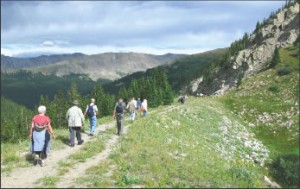by John Mattingly
A front page headline of the June 3, 2009 Denver Post decried, “MORE FARMERS LOSING HOPE, Suicide hotlines field calls as prices fall and money woes mount …”
An early paragraph pointed out: “In the past year, economics and inclement weather have crippled operations, pushing countless farmers to the emotional breaking point, say industry experts.”
Various quotes from farmers articulated hopes and desperations, and a personal story stood out about a farmer who took his own life because he felt he was a burden to those around him.
In 2008, 14 Colorado farmers took their lives, up from 11 in 2007 and 11 in 2006.
Though I have sympathy for those directly affected by these situations, I have a problem with this sort of article for several reasons.
1. The suicide rate for farmers in Colorado is very close to the national average of 12/100,000 (Colorado population at seven million, farmers at 2-3% of the population puts the farmer suicide rate of 14 right at the national average).
So why the headline? Especially considering that in other professions such as the military, banking, even the arts, the suicide rate is many times higher than the average. White male physicians, by the way, have the highest suicide rate, mostly from drug abuse and overdose.
Maybe we care more about farmers than other professionals, or think we do. People in the military are in such high stress situations that suicide in their sector is regrettable but not surprising. If a banker jumps out a window after losing a few million, we usually won’t cry all day about it. If a struggling artist succumbs to existential angst, our mourning will conclude long before sunset. And doctors on drugs don’t pull very hard at our heartstrings. But if a farmer takes his life, it moves us deeply.
While I’ve benefited from this favorable press and perception most of my life as farmer, it has always made me a little uncomfortable. Sort of like an undeserved award, a lucky guess, or the praise of a biased relative. People always say, “Oh, you’re a farmer, you work so hard, you take such risks.” I nod my head, gracefully accepting the compliment, knowing that there are many people in other professions who work much harder than I ever did, and take risks much greater than I ever have. The extensive safety nets provided to farmers, from breaks on taxes to the wonders of crop insurance, are detailed in previous “Farmer Far Afield” pieces. To put a finer point on it, I think people in the publishing business work harder and take substantially bigger risks than most farmers.
2. Who are the “industry experts” who determine farmers are suddenly driven to an emotional breaking point by economic downturns and bad weather? As far as I can remember, the last 42 years of my farming career were nothing but challenging economic times and uncooperative weather. One of my early teachers in the field (not an industry expert) used to say, “Farmers beat the odds with unreliable machines, unwilling help, unknown numbers, and unpredictable weather. And do a pretty damn good job of it.”
Any farmer worth his or her weight in dirt is not only familiar with “economics and inclement weather,” but lives with disturbances from these forces almost daily. The most recent disturbance in the economy is somewhat unique in that commodity prices in 2008 were at record high levels. Many farmers felt justified in thinking these extraordinary prices represented new norms rather than temporary aberrations. As it turned out the latter prevailed, leaving many farmers with the full assortment of frustrations that come with top-heavy markets.
Some farmers sold early, sensibly concluding a doubling in the market price of say, wheat, signaled an intelligent selling price. They then watched their elevator check wither as the price doubled again. It can be more stressful to make crop selling decisions in a rising market than in a falling market.
In other cases, farmers were hit with hail or flood that took their crop, a crop that would have had a market value three or four times the amount of insurance written on the lost crop.
Still others contracted at “reasonable” prices and were thus locked in at a price disadvantage.
A lot of farmers sold high and made extravagant purchases of land and machinery to finally live it up, or to avoid taxes, thinking the good times were here to stay, that the world demand for food had finally overtaken production capacity. Prominent magazines had headlines such as “The End of Cheap Food.” Those growers who sold near the top had an understandable tendency toward optimism and excessive leverage, ignoring the possibility of difficult downward adjustments when prices reversed.
3. The great majority of farmers in Colorado took this latest disturbance in stride. I recall back in the winter of 1973-74, the last time commodity prices went sky high, and I, a young farmer, thought I was king of the world. Until my older neighbors came around and told me, “Heavy is the head that wears the crown. Put that money in the bank; you’ll need it.” And I did. I was lucky to have good neighbors when I started out in the profession, and had the greater good fortune to listen to them.
A headline declaring that “More Farmers Are Losing Hope” is true but somewhat misleading. Question is; more than what? More than two farmers are losing hope, or is it more than thousands? Either could be the case, and the fact that it’s a headline hints at a large number, but the fact is that only a small number of farmers are actually losing hope.
As a cohort, I know few more hopeful than farmers. No matter how bad the previous year, by the time spring rolls around, hope is palpably rising out of the thawing earth. Part of the reason for this is that there are few professions more engaging than those that deal with the earth, with that six to twelve inches of topsoil that keeps us alive. We are hard-wired as a species to hope for good crops, and neither economics nor inclement weather can wither this fundamental and eternal optimism.
John Mattingly cultivates prose, among other things, and was most recently seen near Creede.



